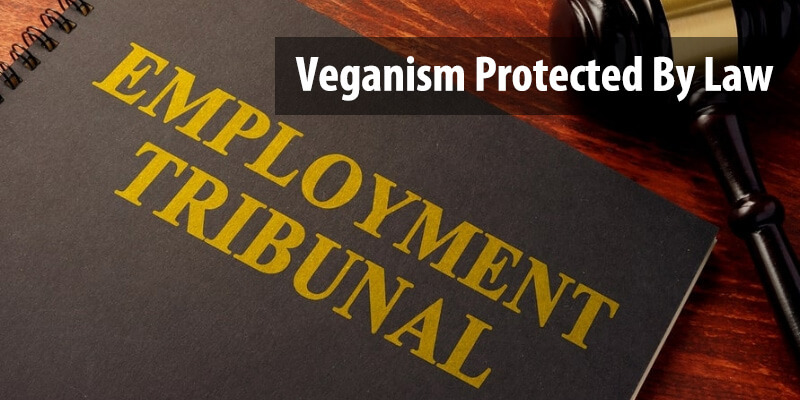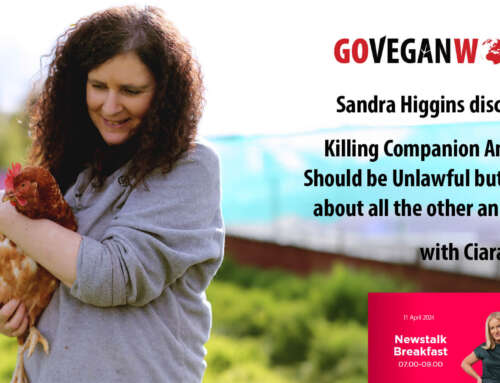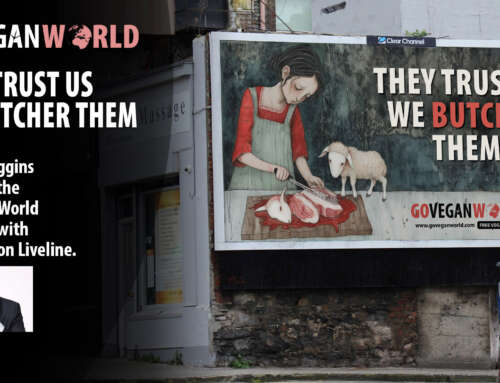Employment Tribunal Confirms Vegans are Protected from Discrimination and Harassment under Equality Law – what does this mean for vegans, employers and service providers?
13 January 2020
On 3rd January 2020 an Employment Tribunal in Norwich, England, ruled that the vegan conviction that it’s wrong to use and kill other animals is a protected “philosophical belief” in terms of the Equality Act, and so vegans are protected from discrimination, harassment and victimisation at work and by service providers, public and private. In making this decision the employment judge was applying existing law, rather than making new law.
Vegans Have the Right to Live According to their Protected Beliefs
As far back as 1993 the European Commission of Human Rights ruled that veganism, the belief or moral conviction that humans should not use or kill other animals, was protected under Article 9 of the European Convention on Human Rights. Article 9 protects both religious beliefs and secular beliefs that concern matters of conscience, such as veganism, pacifism and opposition to military service.
Therefore, since 1993 it has been clear that vegans are protected under human rights law in the same way that people who hold religious beliefs are protected; we have the right not only to hold our vegan beliefs, but to live according to those beliefs. The state/government must take positive steps to ensure that we can live in accordance with our beliefs and may only interfere with that right in very limited circumstances.
In 1998 the UK incorporated the European Convention on Human Rights into UK law. Brexit does not affect this; the UK would have to make a separate decision to withdraw from the European Convention of Human Rights and replace the Human Rights Act to change this.
Protection from Discrimination and Harassment
In addition to human rights, European equality law, implemented in UK law through the UK Equality Act 2010, protects people from discrimination, harassment and victimisation on the basis of specific characteristics including “philosophical beliefs”.
The test for a protected philosophical belief under equality law is very similar to the test for a protected conviction or belief in human rights law, and the fact that veganism had in 1993 been found to be a protected belief or conviction made it reasonably clear that it was also covered by the Equality protections applicable to “philosophical beliefs.”
Decisions from UK employment tribunals finding philosophical beliefs related to climate change and anti-foxhunting to be protected, and a recent decision distinguishing veganism from vegetarianism, gave further strong indications that veganism was covered by equality law.
In the decision on 3rd January 2020, in the case of Jordi Casamitjana v The League Against Cruel Sports, the employment judge looked at the existing law and confirmed that the vegan philosophical belief that it’s wrong to use and kill other animals is indeed protected under Equality law as it is under human rights law. To have this confirmed in such clear terms is very useful, as although a decision from an employment tribunal is not binding on other tribunals or courts, it will be referred to in future cases as an illustration of the correct application of existing law. The decision is not vulnerable to being overturned on appeal, as the League conceded that veganism was protected and so will not be appealing the decision.
The outcome of Mr Casamitjana’s claim that he was discriminated against on account of his vegan beliefs has yet to be decided. While that will be of great importance to Mr Casamitjana and to the League, it will not affect this ruling that veganism is protected under Equality law.
Are People Who Follow a Vegan Diet Protected?
The claimant in Casamitjana v The League Against Cruel Sports referred to himself as an “ethical vegan.” Use of this descriptor is a recent development which has come about to distinguish people who hold the vegan conviction from people who may describe themselves as vegan because they follow a vegan diet, exclusively or some of the time. In fact Mr Casamitjana’s description of his veganism as the manifestation of his recognition that other animals are individual sentient beings who have the right to their own lives, and the right not to be used or killed by humans, is simply a description of veganism, dating back to the 1930’s and 40’s in the UK.
What of people who have adopted a vegan diet but who do not, or not yet, hold the moral conviction that is at the heart of the vegan philosophy? Legally, this remains an open question. To be able to rely on the human rights and equality laws applicable to people who hold protected beliefs, a person who follows a vegan diet but does not hold the moral conviction that we should not use or kill other animals would have to persuade a court or tribunal that their beliefs satisfy the applicable test: that they sincerely hold a fundamental belief that is cogent, serious, important, worthy of respect in a democratic society and not incompatible with the human rights of others, and that is why they follow a vegan diet. It must be a deeply held belief rather than an opinion as to a matter of fact. A recent tribunal decision in which the judge distinguished vegetarianism from veganism is an example of a claimant failing to convince a tribunal that their beliefs satisfy this test.
However, in practical terms it’s going to be cumbersome and time consuming to require individual employees or service-users to convincingly set out their vegan beliefs before provision is made for them. It would be advisable for employers and service providers to assume that they have vegan employees and service users, given the growing number of vegans in the UK, and recognise the risk of claims of discrimination, harassment and victimisation under the Equality Act if they do not provide. They would be well advised to take steps now to ensure that they are providing, and we set out below some of the steps it would be advisable for them to take.
Immediate Steps for Employers and Service Providers
| Food | ensure food suitable for vegans is provided whenever food is made available to staff or service users, in canteens, at meetings, events, functions, in vending machines etc, including plant milks and butters where appropriate. Quantity and quality ought to be comparable. |
| Clothing | ensure vegans are provided with suitable alternatives to uniforms made using animals (wool, leather, silk, feathers); consider phasing out animal materials so standard uniform is suitable for all. |
| Activities | ensure vegans are not excluded from events by avoiding activities using animals, such as the races, zoo, horse riding. Avoid activities involving animal use in classrooms. |
| Culture | minimise the risk of harassment claims by ensuring all staff and pupils are made aware of the true meaning of veganism and the need for respect and consideration for others. |
| Equalities | include veganism in equality and inclusivity policies and practices |
Using Your Vegan Rights
The coverage of this recent decision makes this a very good time to press for improvements in your workplace and from service providers, if you feel able to do so. We have template letters covering various situations which are intended to assist you in referencing your rights and pressing for provision. The letters cover employment, hospital, school and private service providers in the UK.
We provide much more detail on our Vegan Rights pages
If you prefer to listen to a talk rather than read, our Legal Counsel Barbara Bolton gave this presentation at London VegFest recently and summarised this recent decision on BBC Radio 4.
If you have a situation you do not feel able to address yourself, or if you have taken it as far as you can, please contact our Barbara Bolton and we will do our best to assist: Barbara.bolton@goveganworld.com






